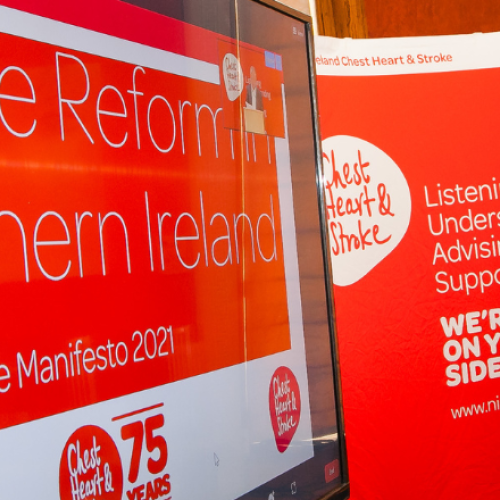- Around 2,800 people are admitted to hospital each year due to stroke, and it causes around 800 deaths annually.
- There are roughly 38,000 stroke survivors living in our communities.
- Approximately two thirds of those who survive stroke are left with a life changing disability
Stroke Manifesto
We launched our new Stroke Manifesto 'Stroke Reform in Northern Irteland: Time for Action' In September 2021 as a call on the Department of Health and the Northern Ireland Executive to act on stroke reform in NI to improve stroke prevention, treatment and care for stroke survivors and their families.
In 2017, we led stroke pre-consultation meetings and workshops with stroke survivors to inform and influence the process of reforming stroke care in Northern Ireland. The formal ‘Reshaping Stroke Care’ consultation on these changes took place two years later in 2019. Progress on these reforms was already slow and political instability and the COVID-19 crisis have sadly further delayed changes.
Northern Ireland urgently needs not just to press on with the Stroke Review but with the development of a wider Stroke Strategy that addresses prevention, acute care, rehabilitation and support in the community, and our Manifesto outlines ten objectives to achieve improvements across these areas.
Download a copy of our Stroke Manifesto.
We launched our new stroke manifesto document with a ‘hybrid’ online and in-person event taking place at the Long Gallery at Stormont. The event was attended by political figures and leading health officials. The event was addressed by leading stroke consultants from Great Britain and the Republic of Ireland as well as the Chief Medical Officer, Prof Sir Michael McBride.
Atrial Fibrillation (AF)
- Atrial Fibrillation (AF) is a type of irregular heartbeat which can increase risk of stroke by up to five times.
- There are over 40,000 people on the AF Register in Northern Ireland
- Approximately 10,000 people may also currently be living with undiagnosed AF, who are at a much higher risk of stroke.
In 2019/20 an inquiry was conducted into AF detection and management in Northern Ireland. This was led by Dr Niamh Kennedy from Ulster University. The study, commissioned by NICHS, engaged with clinicians at every level across Northern Ireland.
The Inquiry brought forward nine recommendations to be implemented by the Department of Health and other key stakeholders to improve diagnosis, treatment and prevention of Atrial Fibrillation in Northern Ireland.
- Develop an AF strategy for Northern Ireland.
- Aim to identify 85% of people with AF by March 2023 and 90% by 2025.
- Create a clear clinical pathway for AF.
- Invest in technologies in clinical practice to detect AF and monitor treatment.
- Increase AF detection rates by targeted case finding based on AF risk factors.
- Address the echocardiograms (ECG) waiting list issue including tackling any workforce issues.
- Provide information and education to people living with AF.
- Prioritise improving adherence to treatment for existing AF patients to prevent future strokes.
- Commission the Public Health Agency to identify the most effective methods to raise public awareness of AF.

